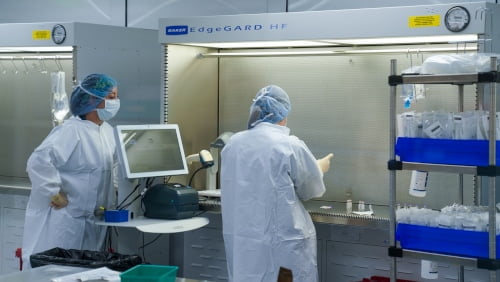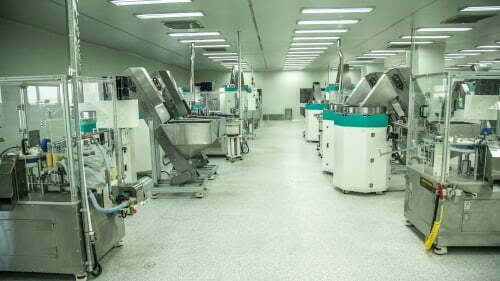Pharmacy Technician Careers
Today’s pharmacy technicians can work in a variety of different types of career settings, each with its own nuances. Majority of the time, a pharmacy technician will work closely with a licensed pharmacist however, there are multiple positions available as a certified pharmacy technician!
A major misconception with the role has led many to believe that a pharmacy technician can only work behind the counter of a retail pharmacy, which is 100% not true! There are many positions in the field that become available once certified with the CPhT credentials.
Compounding Specialist
The purpose of pharmacy compounding is to meet the needs of people who are unable to take medication in the commercial form. Compounded medications are ordered by a licensed physician, nurse practitioner, veterinarian, or other prescribers, and mixed by licensed and skilled compounding pharmacy technicians in a safe and carefully controlled environment. Some compounds are sterile, and some are non-sterile. Technicians working in these areas need special training and certification.
Inpatient Technician
An Inpatient Technician works in a hospital and performs various duties such as delivering medications to patient floors, prepackaging, compounding, restocking, preparing IV’s, TPN’s, reconciling medications, billing, adjusting patient accounts and many other tasks.

Pharmaceutical Sales
Pharmaceutical Sales Technicians work for companies that allow them to interact with physician offices, clinics, pharmacies, hospitals, veterinarians, and other companies that purchase medications wholesale. Most believe that a pharmaceutical sales rep would require advanced degrees however, that are some employers, particularly manufacturers, that will allow certified pharmacy technicians to process orders.
Compliance Specialists
Compliance Specialists work together with the federal government (DEA) in accordance with the DEA’s “get to know your customer Initiative” act. These technicians work in close relationships with customers, as well as staff, to monitor transactions and behavior patterns that could be defined as suspicious or cause concern.
Pharmacy Informatics
Information Technology (IT) plays such a vital role in everything we do, especially regarding healthcare and medication related outcomes. The role of the Pharmacy Informaticists’ is to ensure that appropriate systems are in place to support systems such as e-prescribing, computerized prescriber order entry (CPOE), electronic medical records (EMR), barcode dispensing and administration systems, and automated dispensing cabinets, to name just a few.
Insurance Verification Technicians
Insurance Verification Technicians are responsible for processing claims, looking at rejections, monitoring frequency of medications, therapeutic duplications, and in some cases initiating the enrollment process. Most of these types of positions are in office buildings or some may be work from home.

Prior Authorization Technician
A Prior Authorization Technician has a broad wealth of knowledge in insurance, formulary and non-formulary medications, days’ supply, and disease states. These technicians ensure that certain medications are approved for treatment, and if not, the alternative medication that can be dispensed/recommended.
Pharmacy Discharge Carriers
Pharmacy Discharge Carriers play an important role in the Medication Therapy Management process (MTM), as they prepare medications for patients who are transitioning from being in the hospital to going home. This may require coordinating the medications prescribed in the hospital to what will be written by the physician and filled at their local pharmacy.

Patient Records/Medication Historian
Effective communication skills come into play when interacting with patients. Pharmacy technicians gather histories, including all current drugs the patient takes. It’s vital to obtain accurate data for proper diagnosing when the physician reviews the information. These types of positions are mostly available within a hospital system.
Pharmacy Technician Trainer
A Pharmacy Tech Trainer can serve as a preceptor or a lead technician. These technicians have the responsibility of embracing new hires and students and getting them acclimated to the new work environment. Under the supervision of the pharmacist, they have the magnitude to offer insight, make corrections, and evaluate other technicians on their job performance.
Pharmacy Processor (Manufacturing/Distribution)
Manufacturing technicians are typically in labs and/or a part of assembly lines that create and develop different types of medications. These positions are often controlled through certain pharmaceutical manufacturers and distribution centers.

Academia
Pharmacy Technicians can serve as instructors for trade schools, colleges, proprietary and non-proprietary programs. They instruct students in various areas such as pharmacology, prescription processing, dosage forms, calculations, law and ethics, and pharmacy practice setting.
Infusion Technicians
Infusion Technicians work for Home Infusion companies that prepare medications and ship them to the patient’s residence for long-term therapy. The medications can vary from antibiotics, chemotherapy, hydration, TPN’s, Hemophilia-Blood factor products, enteral feedings, and Primary Pulmonary Hypertension (PPH).
Oncology Technicians
Oncology Technicians can prepare radioactive materials that will be used to diagnose and treat specific diseases for diagnosis and therapy. Institutional Oncology Technicians work for large medical centers or hospitals, while Commercial Oncology Technicians prepare and dispense radiopharmaceuticals as unit doses that are then delivered to the subscriber hospital by nuclear pharmacy personnel. Some employers may require the CSPT Certification and/or relevant certification.
Other Considerable Careers:
-Retail Lead Technician
-Retail Pharmacy Technician District Trainer
-Pharmacy In-Patient Purchaser
-Pharmacy Inventory Specialist
-Pharmacy Care Coordinators
-Pharmaceutical Strategist
-Pharmacy Technician Analyst
-Pharmacy Assistant
*Some positions may require state licensing and/or special/prior training in addition to the CPhT.
